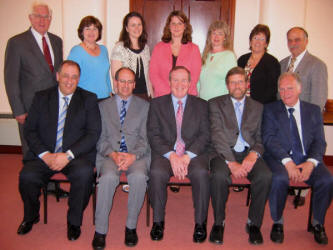The Da Vinci Code Exposed - The Truth about the Gospels

Pictured at a Guest Service
in Lisburn Reformed Presbyterian Church,
Ballymacash on Sunday evening 4th
June is L to R: (front row) Minister and elders
- Marcus McCollum, David Currie, Rev. Professor
Robert McCollum, John Somerville and Mervyn
Green. (back row) Guests from San Jose,
California and Lynden, Washington - Donald
Jamieson, Karen Jamieson, Rachel Alderliesten,
Martha Bons, Joyce Jamieson, Jeannie Warner and
Ed Warner.
A guest service was held in Lisburn
Reformed Presbyterian Church on Sabbath evening 4th
June. The minister, the Rev. Professor Robert McCollum, took as
his theme �The Truth of the Gospels�. In his sermon he
interacted with the contents of the Da Vinci Code written by Dan
Brown. He informed the congregation of some of the allegations
that Dan Brown makes in his book. For example, Brown says that
the Gospel accounts (Matthew, Mark, Luke and John) are not
authentic. He alleges that they were 4th Century
concoctions authorized by the new emperor Constantine.
Mr McCollum explained that aspects of the
Da Vinci Code are completely contrary to historical fact.
Constantine, when he came to power in the Roman Empire, was a
friend of Christianity. After the intense persecution under
Diocletian that preceded Constantine�s reign, Bibles were in
short supply. He ordered and financed, not the productions of
new gospels, but copies of Bibles which had been in circulation
for generations.
Mr McCollum concluded his sermon by
pointing out the present relevance of the gospel as recorded in
John chapter 20 verse 31. �� these are written that you may
believe that Jesus is the Christ, the Son of God, and that by
believing you may have life in his name.
He informed the congregation that the Jesus
of the Da Vinci Code was a pathetic figure who could save no
one. In contrast, Jesus Christ revealed in Scripture lived and
died for his people. As their representative he secured
salvation for them and, �is able to save completely those who
come to God through him�.
After the service many of the visitors
remained for further discussion and fellowship over a cup of
tea.